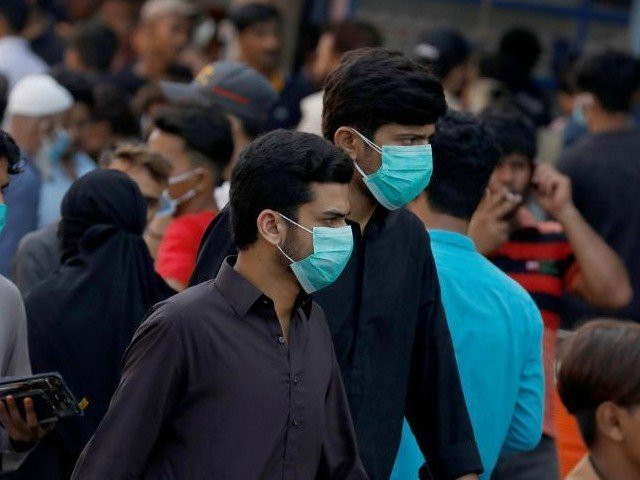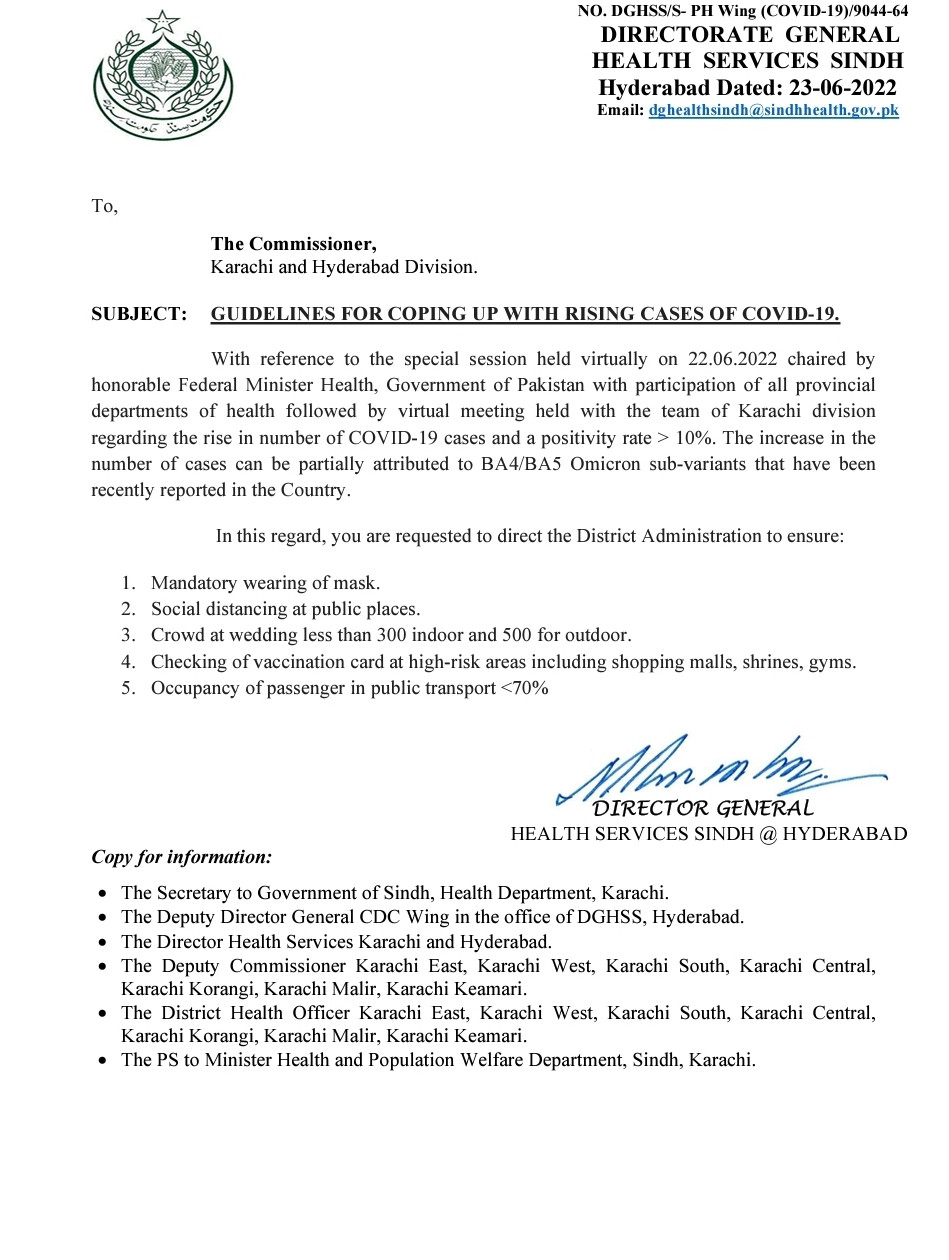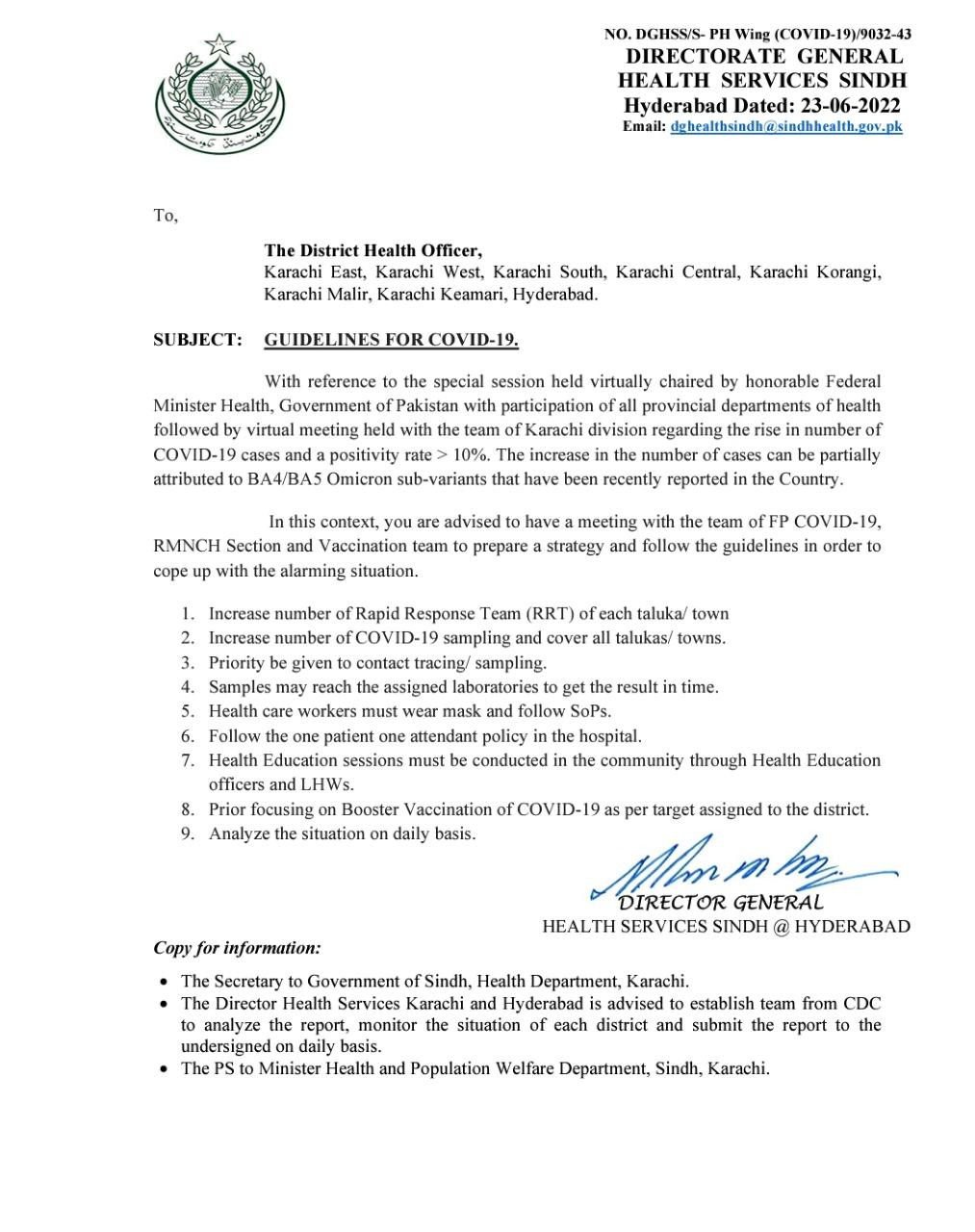
Covid-19 guidelines reinstated in Karachi to mitigate 'alarming' rise in cases
Karachi's positivity ratio currently hovers around 15.85pc
The Sindh government has reinstated non-pharmaceutical intervention (NPI) guidelines for Karachi to mitigate the "alarming" rise of Covid-19 infections in Karachi.
As per the directives issued by Director General Health Services Sindh, the new NPIs include wearing of masks, social distancing at public gatherings, and the reduction of passenger occupancy in public transport to 70 per cent.
Furthermore, checking of vaccination cards at high-risk areas such as shopping malls, shrines and gyms will also to be reinstated. According to the circular issued, wedding ceremonies will also be limited to 300 people for indoor events and 500 persons for outdoor events.
Read India records 12,213 new daily cases of COVID-19
The director-general of health services in Sindh also called for an increase in the number of Rapid Response Teams, Covid-19 sampling, and focus on booster vaccinations.
Speaking to The Express Tribune, Parliamentary Secretary on Health Qasim Siraj Soomro said though the positivity ratio was high, there is still no hospitalization [at the moment]. “And that’s all because of vaccination.”
He added that the people of Sindh were fully vaccinated. “It works and we don’t have any serious patients,” he explained. “Majority of patients have mild symptoms like fever and flu.”
Advising the general public, Soomro said citizens who got their Covid-19 vaccination jabs some six months back should go for a booster dose.
“The virus has not gone. It’s still there and we all should take precautionary measures,” he urged and added that the booster drive was underway across the province.
However, a senior official in the department of health complained that the majority of the residents in the provincial capital were [still] not taking the virus seriously. “They do not want to get vaccinated in some areas,” he added and added that the response in Karachi’s district South and posh localities was satisfactory.
Pakistan Medical Association’s Secretary-General Dr S.M Qaisar Sajjad said that the Omicron variant spreading in the city. “There is no social distancing. No one like to wear masks now. People believe the virus has gone.”
The doctor said that the reason for the spread of the virus was because of the attitude of the general public. “The government should launch a drive to raise awareness in the people to maintain the social distancing and wear a mask in public spaces,” he urged.
Sindh health authorities on Wednesday urged the public to adopt caution during the upcoming Eidul Azha holidays.
Rising rates of coronavirus infections
The national Covid-19 positivity rate was recorded at 2.22 per cent over the last 24-hour period. The National Institute of Health (NIH) confirmed 309 new cases and said 13,941 tests were conducted across Pakistan during the same time period. Of the active cases, 80 coronavirus patients remain under intensive care.
Read more Some Omicron sub-variants escaping antibodies from Sinopharm shot - Chinese study
The positivity ratio in Sindh was reported at 6.10 per cent rate - almost triple the national average.
This is followed by Mardan where the ratio stands at 4.76 per cent while Mirpur in Azad Kashmir and Lahore have both recorded 2.38 per cent positivity ratio.
Peshawar is at 2.24 per cent, followed by Islamabad at 1.63 per cent, Rawalpindi at 1.52 per cent and Gilgit at 1.42 per cent.
It may be mentioned here that Pakistan reported the first case of the latest sub-variant of Omicron in May this year. The new sub-variant is responsible for the latest wave of Covid-19 infections across the globe. Subsequently. the prime minister restored the National Command and Operation Centre (NCOC) which was dissolved a month earlier.
Pakistan’s response to the pandemic has been lauded internationally and was considered to be one of the countries that tackled the virus well enough to keep the outbreak from getting worse.
Earlier in March, a report by the United Nations Development Programme placed Pakistan among countries that have done fairly well in the fight against the Covid-19 pandemic.
It noted that on March 23, 2022, the cost of vaccinating 40 per cent of the population in Pakistan was 13.95 per cent of the country’s current health expenditure.
















COMMENTS (1)
Comments are moderated and generally will be posted if they are on-topic and not abusive.
For more information, please see our Comments FAQ